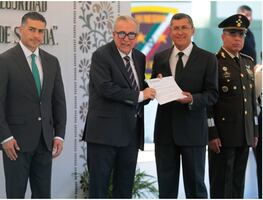Más Información

Videojuegos, el nuevo gancho del crimen para captar menores; los atraen con promesas de dinero y poder

“Vamos a dar apoyo a los pequeños agricultores por sequía en Sonora”; Claudia Sheinbaum instruye a Berdegué

Derrota de México en disputa por maíz transgénico contra EU; estos son los argumentos de Sheinbaum y AMLO para prohibirlo
Austerity has come to an end for European armed forces since resources are moving again to modernize their defense power.
Money began to move before the arrival of Donald Trump , who on his first visit to Brussels as President of the United States repeated his demand to most European nations to invest at least 2% of their GDP on defense, as agreed at the 2014 NATO summit.
The question of the armament industry and specialized institutes is how much will Trump's stance influence Europe's spending. Experts argue that Europe is unlikely to start an arms race as consequence of the “ blackmailing ” policy used by Trump.
Aude Fleurant
, Director of the Arms and Military Expenditure Programme at the Stockholm International Peace Research Institute (SIPRI), told EL UNIVERSAL that since the 2008 crisis, the defense sector became a "volatile and flexible currency" bounded by other national priorities. So that, she said, Europeans can adjust at any moment their military budget, regardless of what Trump says.
Military spending in Western Europe grew 2.6% in 2016 for the second year running, 2.6% compared to 2015. The most remarkable increase was in Italy , with 11%, which is involved in the development of the ambitious Joint Strike Fighter (JSF) international program to create a new type of tactical aircraft. There were also significant increases in the countries of Central Europe, with a 2.4% overall between 2015 and 2016.
The increases were for the upgrading of software and the purchase of new equipment , from airplanes and helicopters to tanks, radars, and frigates. For 2017, there are indicators that predict that spending will continue increasing moderately.
Fleurant explained that the increases are connected to three essential factors: First, the economic situation offers greater flexibility to national budgets. The European Union (EU) is going through its fifth year of recovery. According to the European Commission , the EU grew 1.7% in 2016.
Second, the illegal annexation of Crimea by Russia in 2014 and its support to eastern Ukrainian rebels have forced Europeans to raise their guard.
"Most of the increase can be attributed to a feeling of insecurity caused by Russia's lack of clarity about its real intentions regarding its western border," says Fleurant. Russia's military spending is equivalent to a quarter of all European NATO countries.
The third element relates to a change in the attitude of the public opinion . It is not that we have to prepare for war, it has to do with national security and the relevance of NATO . Not with the claim issued by Trump during the NATO summit that Europeans have to do more for their defense," she said.
Of the 28 members , only the United States, Greece, Estonia, the United Kingdom and Poland meet the 2% goal.
If all the allies met the established goal, the collective military spending would increase by USD$159 billion , meaning, they should spend annually 18% more than what they are currently spending.
Germany
would be the one which had to spend the most. Berlin would move from the 9th to the 4th position in the list of countries with the highest military budget.
Spain and the Netherlands
would need USD$10 billion and 6 billion , respectively. In the global ranking, Madrid would move from the 17th to 13th position , while Amsterdam would jump from the 26th to 18th .
Between 2006 and 2013, the EU's military spending fell by 15% , aggravating the gap with the US. While Europeans spent $186 billion euros collectively in 2013, the Pentagon alone spent $600 billion .
While the European Parliament's Directorate-General for External Policies considers that Europeans have military forces sufficiently equipped to deal with potential threats, it also recognizes that they have fallen short of strategic power in the air, sea, air-to-air, intelligence, surveillance and recognition sectors .
mr







